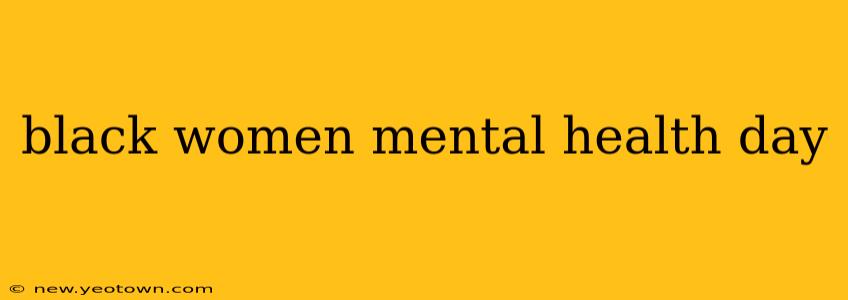It started as a quiet whisper, a recognition of a silent struggle. Now, Black Women's Mental Health Day is a powerful roar, a call for awareness, support, and change. It's a day dedicated to acknowledging the unique mental health challenges faced by Black women and celebrating their incredible resilience. But more than just a date on the calendar, it represents a continuous commitment to dismantling systemic barriers and fostering a community of healing and empowerment.
Why is Black Women's Mental Health Day Important?
The importance of Black Women's Mental Health Day can't be overstated. Black women navigate a complex web of societal pressures, historical trauma, and systemic inequalities that significantly impact their mental well-being. From the relentless pressure to be strong and resilient, often at the expense of their own needs, to the added burdens of racial discrimination and sexism, the challenges are multifaceted and deeply rooted. This day provides a crucial platform to:
- Raise Awareness: Many mental health challenges faced by Black women are often overlooked or misunderstood. The day serves as a vital opportunity to shed light on these issues and encourage open conversations.
- Reduce Stigma: Talking about mental health is still a taboo in many communities. Black Women's Mental Health Day helps break down the stigma associated with seeking help, creating a space for vulnerable women to feel safe and supported.
- Promote Self-Care: Prioritizing self-care is often neglected, particularly among Black women who frequently prioritize the needs of others. The day emphasizes the importance of self-compassion, self-preservation, and engaging in activities that nourish the mind, body, and spirit.
- Advocate for Change: Ultimately, the day is a call to action. It encourages advocacy for policies and programs that address the systemic issues contributing to mental health disparities within the Black community.
What are the unique mental health challenges faced by Black women?
The mental health challenges faced by Black women are unique and intersect in complex ways. They often experience a disproportionate burden of stress stemming from multiple factors:
- Racial Discrimination: The constant experience of racism, microaggressions, and systemic inequalities takes a significant toll on mental health. The everyday stress of navigating a world that often feels hostile can lead to anxiety, depression, and post-traumatic stress.
- Sexism and Gender Inequality: The double burden of racism and sexism creates unique challenges. Black women often face gender-based violence, discrimination in the workplace, and limited access to resources and support.
- Socioeconomic Disparities: Many Black women face significant socioeconomic disadvantages, including poverty, lack of access to quality healthcare, and limited opportunities for education and economic advancement. These factors can exacerbate existing mental health challenges.
- Historical Trauma: The legacy of slavery, Jim Crow laws, and ongoing systemic racism has created a collective trauma that continues to impact the mental health of Black women today. This intergenerational trauma manifests in various ways, often unseen and unaddressed.
- Caregiver Burden: Black women frequently act as primary caregivers for family members, which can lead to burnout and overwhelming stress.
How can I support Black women's mental health?
Supporting Black women's mental health is a collective responsibility. Here are some ways you can make a difference:
Educate Yourself: Learn about the unique challenges faced by Black women and the resources available to support them.
Listen and Validate: Create safe spaces for Black women to share their experiences without judgment.
Challenge Systemic Inequities: Advocate for policies and programs that address racial and gender inequality.
Support Black Mental Health Professionals: Seek out and support mental health professionals who understand the cultural nuances of Black women's experiences.
Practice Self-Care: Taking care of your own mental well-being allows you to better support others.
What resources are available for Black women struggling with their mental health?
Numerous resources are available to support Black women struggling with their mental health. It's crucial to find a therapist or counselor who understands and is sensitive to the cultural experiences of Black women. Additionally, peer support groups and online communities can provide valuable connection and support. Many organizations are dedicated to improving mental health access and equity within the Black community. Researching and finding resources tailored to your specific needs is a critical step in the healing process.
Black Women's Mental Health Day isn't just a single day of remembrance; it's a continuous movement toward creating a more equitable and supportive world for Black women. By acknowledging the challenges, amplifying their voices, and actively working towards solutions, we can collectively foster a future where mental well-being is prioritized and celebrated for all.

